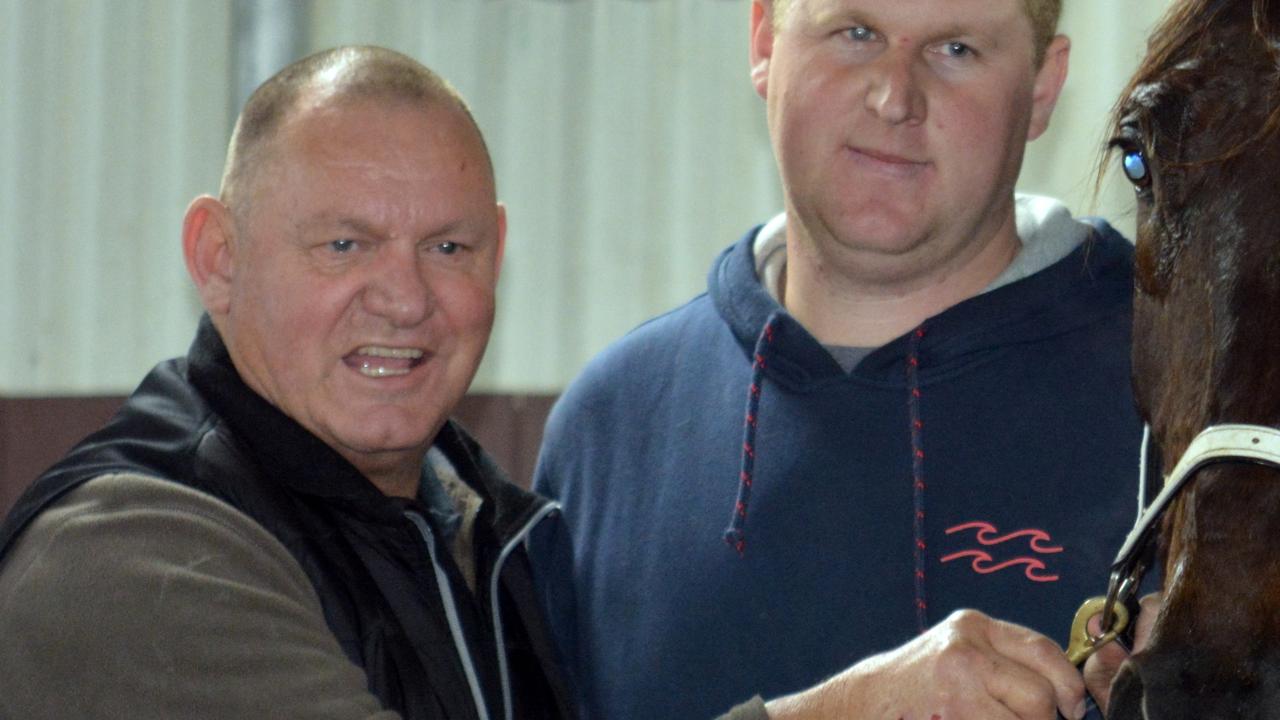Premier Jeremy Rockliff ‘disappointed’ by Voice outcome, but won’t pursue state Voice
Premier Jeremy Rockliff says he’s disappointed by the Voice outcome, but he’s ruled out pursuing a state version. Latest.
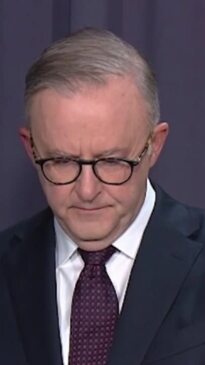
Tasmania
Don't miss out on the headlines from Tasmania. Followed categories will be added to My News.
Premier Jeremy Rockliff says he is “disappointed” at the failure of the referendum over the weekend - but has knocked back suggestions that Tasmania should implement its own Voice to Parliament.
While doubling-down on his commitment to Indigenous Tasmanians, Mr Rockliff was not swayed on whether the state should enshrine a local version of the Voice in its constitution.
“I am the most senior Liberal in the country that has stood up and supported and advocated for a Yes vote. And I never shied away from it,” he said on Sunday when asked why he didn’t campaign harder in his own electorate, Braddon.
“I will always work towards supporting Indigenous Australians.”
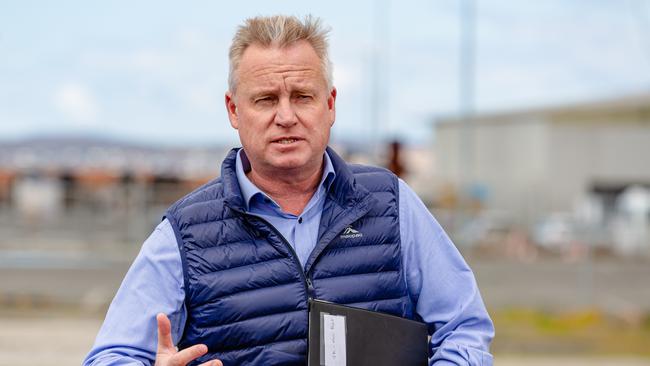
At the time of writing, Braddon - which covers the state’s west and north-west - had voted just 27.40 per cent in favour of the Voice, the lowest Yes outcome of any electorate in Tasmania.
But Mr Rockliff said he didn’t have plans to introduce a Tasmanian Voice to Parliament, similar to what is happening in South Australia.
“No, I have no plans for our own Voice at this stage,” he said.
“What I am saying is that we’ve got an existing process in place where we are on a pathway to treaty through truth-telling, we have started that journey already and will continue to do so.”
Mr Rockliff said if “there is one thing” that unifies Tasmanian voters in the wake of the referendum’s failure, it was increased awareness of Indigenous disadvantage, “and the need to do better”.
Opposition leader Rebecca White also expressed her disappointment at the outcome.
“While it wasn’t the outcome we were hoping for, we accept the judgement of the Australian people,” she said in a statement, thanking volunteers who helped with the Yes campaign.
“As the Prime Minister made clear, our commitment to work with First Nations people and close the gap doesn’t end with this result, because there’s so much more that needs to be done.”
Tasmanian Senator Tammy Tyrell took to social media platform X to say she was “disheartened…but not surprised” by the results.
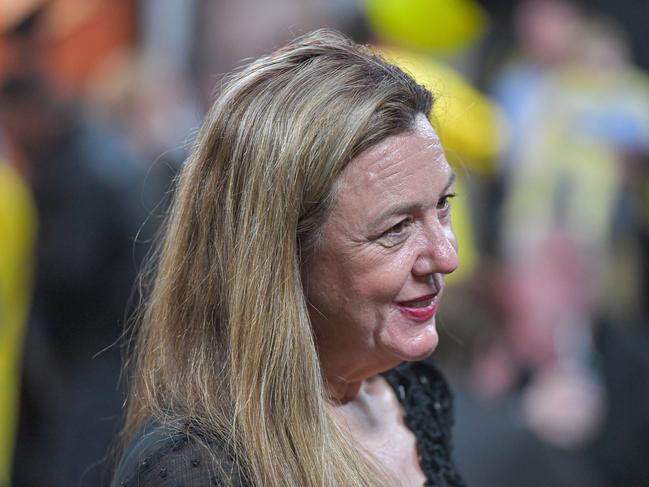
“As an unenthusiastic yes, I shared some concerns about how the Voice would operate, but ultimately felt this was the time to draw a line in the sand and move forward as a country. I believe we can still do this without the Voice,” she said.
Voice defeated: Clark and Franklin buck the trend
October 15, 1:20pm
The Hobart and southern electorates of Clark and Franklin are the only two bucking the trend of a Tasmania that has said No.
Saturday’s historic referendum for a Voice to Parliament was dealt a shock fatal blow when it became apparent that Tasmania - considered to be a stronghold for the Yes campaign - was also going to fall in line with the rest of the nation.
As of Sunday morning, the results were clear that only the Hobart-based electorate of Clark and the southern seat of Franklin - encompassing the city of Clarence, Kingston and the Huon Valley - had voted yes.
At the time of writing, those seats had voted 58.03 per cent and 50.51 per cent Yes, respectively.
Also as of Sunday morning, the north-east division of Bass, encompassing Launceston, had voted just 38.42 per cent in favour of the Voice.
Meanwhile, the north-west and west electorate of Braddon had voted just 27.39 per cent in favour, while the central and east-coast electorate of Lyons voted 32.24 per cent.
In total, out of the 316,834 Tasmanian votes counted so far - out of about 400,000 enrolled voters - 59.2 per cent had voted No.
Prominent Tasmanians have started taking to social media to express their thoughts about the outcome.
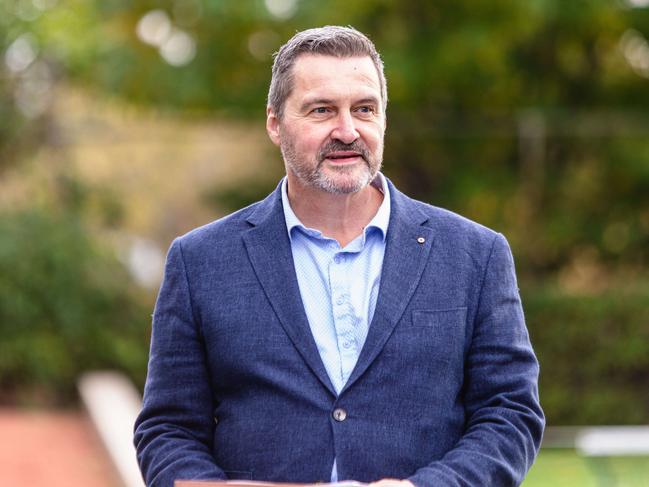
“Thank you, all the advocates and organisers who worked so hard for Yes and to the Indigenous leaders who inspired us to believe change is possible,” LGBTIQA+ advocate Rodney Croome said.
“Tasmania’s Yes vote was higher than the national average and equal second among the states. I hope that encourages our state government to move forward with its plans for truth-telling and a treaty.”
High-profile lawyer and chair of the Tasmania Prisoners Legal Service, Greg Barns SC, commented the results were similar to the nation’s last referendum - for the nation to become a republic.
“Just like 1999 the lies and nastiness of the No case wins out,” he posted on X, the platform previously known as Twitter.
‘We’ve got to unite’: What’s next after defeated Voice?
October 15, 8:30am
Tasmanians have voted No to enshrining a Voice to Parliament in the Constitution, defying the projections of pollsters and effectively dooming the referendum to failure.
There were about 400,000 Tasmanians enrolled to vote in the referendum and while opinion polls had indicated that Tasmania may be the only state to return a majority Yes vote, the bulk of the state’s voting population has opposed the Voice.
At the time of print, 288 of 306 polling places in Tasmania had returned results, with 40.55 per cent voting Yes and 59.45 per cent voting No.
The national average result was 42.92 per cent Yes and 57.08 per cent No.
The Voice would have provided advice to the federal parliament and the executive government on policies affecting First Nations people.
For a referendum to be carried, a double majority needs to be achieved. In the case of the Voice referendum, this would have required a national majority of voters and a majority in at least four of the six states to return a Yes result.
Prime Minister Anthony Albanese visited Hobart on the final day of the referendum campaign in a last-ditch bid to drum up support for a Yes vote in a state considered crucial to the national result.
All three leaders of Tasmania’s main political parties – Premier Jeremy Rockliff, Labor leader Rebecca White, and Greens leader Rosalie Woodruff – have publicly supported the Voice.
However, Aboriginal activist and lawyer Michael Mansell, a prominent opponent of the Voice, said there had been no “groundswell” of support for the proposal in the Tasmanian Aboriginal community, which he believed was ultimately a factor in the state voting No.
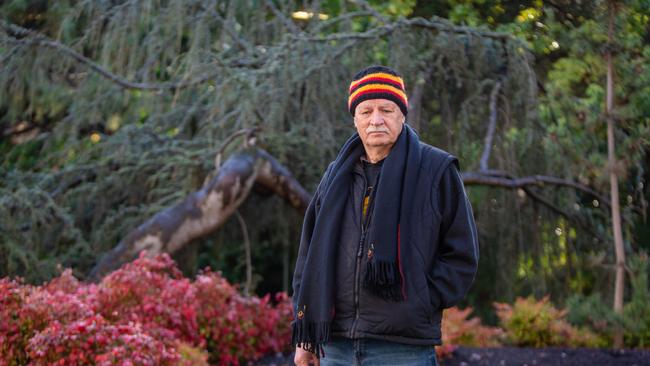
“Over the [last] 30 years, with the land rights [debate] in the ‘90s [and] the Stolen Generations compensation in 2006, there’s always been broad support in the [wider] community if there was a groundswell of Aboriginal support. And that was missing in this campaign,” he said.
Mr Mansell, who believes the Voice would have undermined indigenous self-determination, said the Yes23 campaign team should remain “intact” and turn its focus to overcoming indigenous disadvantage through the Closing the Gap targets.
“I think it’d be just a tragedy to let people who put so much into it just walk away and dissipate in the wind,” he said.
Tasmanian Liberal senator Jonathon Duniam, a leading figure in the local No campaign, said he “wouldn’t say I’m glad” that the referendum had failed, adding that the fallout of the result would be “in many respects, something that is going to be difficult for our country”.
“We’ve now got to unite. The job we have to do is we’ve now got to focus on what we can do with the resources available to us to actually fix the situation facing indigenous Australians,” he said.
Speaking on ABC TV on Saturday night, Yes23 campaign director Dean Parkin said the movement to meaningfully recognise First Nations people “will be back” regardless of the final result of the referendum.
“The reconciliation movement has had our setbacks in history … it always returns,” he said.
It’s understood the Yes23 campaign team collectively decided that its local spokespeople would refrain from commenting publicly on the referendum result in the event of a defeat.
Counting underway: A breakdown of Tasmania’s votes
6:52pm
The results from Tasmanian polling booths have started to flood in, with early indications suggesting a majority of the state’s voters have rejected the Voice.
While it’s still much too early in the night to predict the final result for Tasmania, it appears that the Yes campaign has failed to win over enough of the state’s voting population to secure a majority Yes vote in the island state.
As at 6.42pm, more than 50 polling booths in Tasmania had returned results, with 34.83 per cent voting Yes and 65.17 per cent voting No.
Nationally, more than 760 booths had been returned and the Yes vote was sitting at 39.02 per cent and the No vote at 60.98 per cent.
POLLS CLOSED: Counting underway for the Voice
October 14, 6:10pm
Polls have officially closed in Tasmania and counting has begun to determine whether or not Australians have voted to enshrine an Indigenous Voice to Parliament in the Constitution.
More than 9 million people across Australia were required to vote at a polling centre on Saturday, after 6.13 million cast their ballots at early voting centres in the fortnight leading up to the day of the referendum.
About 2 million Australians applied for a postal vote, while 135,000 voted via a mobile polling team and 47,000 cast a vote at one of 100 overseas polling places.
Previous opinion polls have suggested Tasmania is the only state with a majority of its voting population in support of the Voice. But a final Newspoll conducted between October 4-12 showed 54 per cent of Tasmanians were opposed and 41 per cent supported it.
Results from the referendum are expected to start trickling in from 6pm AEDT, with all votes cast on the day, the majority of pre-poll votes, and a small number of postal votes to be counted on Saturday night.
An indication of the final result will be made tonight by electoral analysts. However, whether or not that indication is clear will depend on how close the margin is.
A double majority, which consists of a national majority of voters and a majority in at least four of the six states, needs to be reached in order for a Yes result to be carried.
‘They’re not asking for much’: Tasmanians cast their ballots
October 14, 4:20pm
With polling data suggesting Tasmania will be the only state heading towards a majority Yes vote, The Mercury found there were more Yes campaigners at booths on polling day.
After travelling across the Greater Hobart area, only one No campaigner spoke to the Mercury at Lindisfarne Community Activities Centre.
He believed the ballots were evenly split among voters.
“There will definitely be a No, but it might not be a No in Tassie,” Pete Nielsen said.
“But here at the community centre, the voters are about half and half.
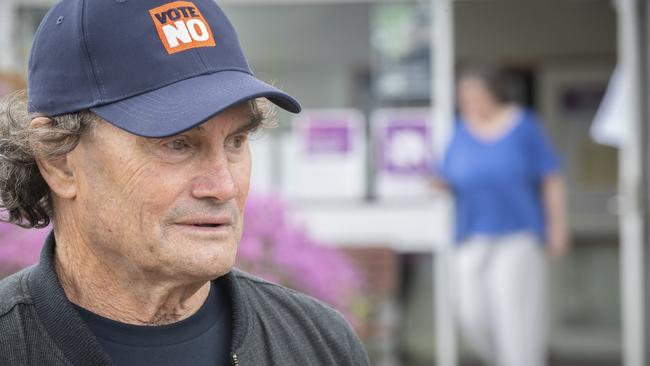
“Everyone’s been talking about it for that long, we’re pretty much over it. We’ve been waiting for the day to put your vote in and then that’s it.”
Passionate Yes campaigner Lucy Ward said she will be devastated if the Yes vote falls through.
“I hope it’s one of those polls that they got wrong again,” she said.
“The idea of saying ‘if you don’t know, vote No’ is possibly the most revolting slogan you could possibly ever use.
“I’ve said to my child doing a maths question, ‘if you don’t know the answer to it, don’t worry, just put no’, we wouldn’t do that. We’d say let’s find out how to do it. It’s just stupid, ignorant and sad and I don’t want to live in a stupid, ignorant and sad country.”
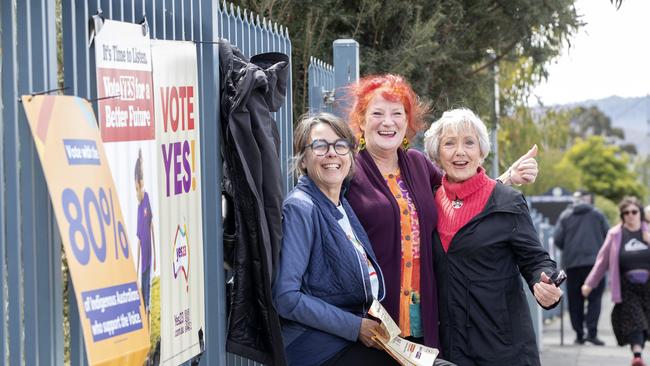
At New Town Primary School, Mary Bell said if Australia votes No, it will leave a “black mark” on the country.
“Everyone in the country will move forward except our First Nations and we should be exactly the same as every other country,” she said. “They’re not asking for much.”
Tasmanians hit the polls to vote on Voice to Parliament
October 14, 1:30pm
Tasmanian voters have quietly hit the polls, keeping their decision close to their chest as polling booths open across the state.
Independent MLC for Nelson, and Yes supporter, Meg Webb, said there was a positive energy at the Mt Nelson Primary School polling booth on Saturday morning.
“People have mixed views, and others are holding their cards close to their chest, but we’re getting a lot of people very positive and indicating that they are voting Yes,” she said.
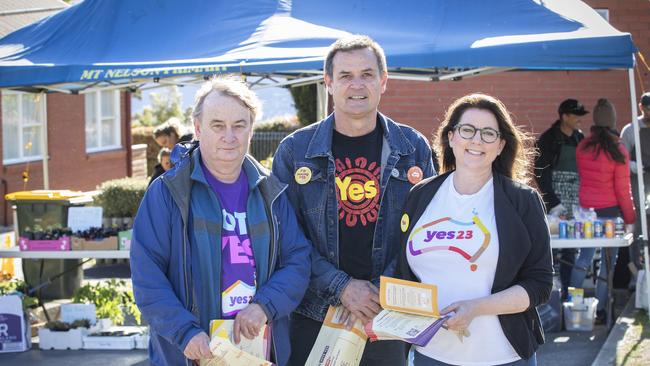
“Naturally, a lot of people will be feeling quite concerned about a vote that goes No and that’s really understandable and we all will have to deal with it tomorrow if that’s the way things go. “I’m very hopeful that the effort that has been put in, especially in this last week, will really turn the tide and see us coming out of this sounding Yes.”
The Australian Electoral Commission revealed nearly eight and a half million Australians had voted early either voting in person or via the post.
Indigenous woman Olivia Bayly went to information sessions held by the University of Tasmania, where she came to the conclusion she would vote Yes.
“Of course, the Aboriginal community does have a Voice, but they don’t have that place in parliament where the media is going to really pay any attention,” the 21-year-old said.
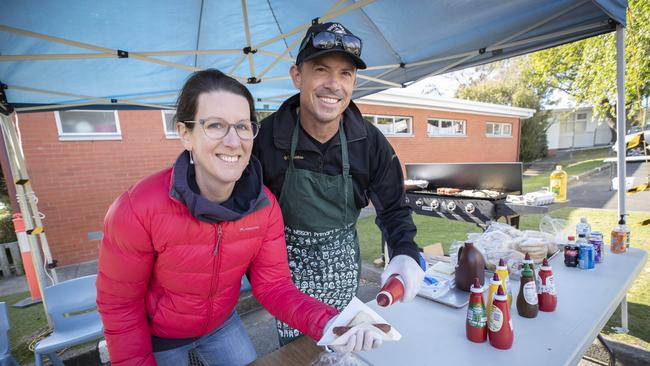
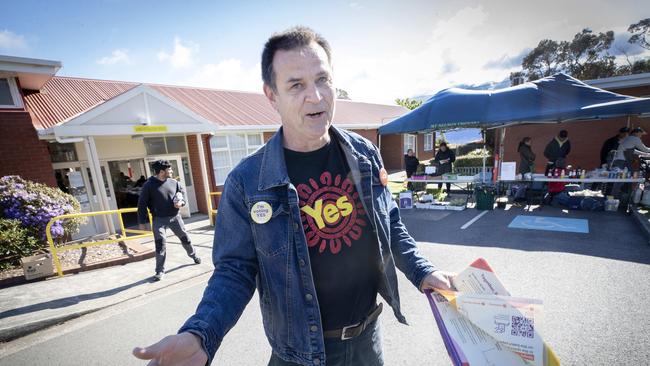
“At least with a Voice to Parliament in a political sense, the media will have more coverage on things like their opinions and thoughts about things.
“That in itself is worth the vote because more people are going to be informed about how the Indigenous community feels about things.”
It was a family affair for the Whitehead family to attend the polls in Mt Nelson with their dog Tillie.
Kimmy Whitehead said she was hoping the outcome of the Voice referendum would be Yes.
“There’s always a partial worry that it will swing No, but from what I can gather especially from the youth, it’s definitely a Yes,” she said.



